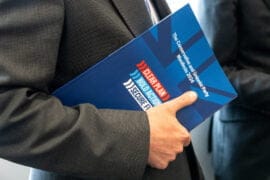Election reflection—are we entering a new era of government and politics?

Change is in the air.
Could this be due to the change of personnel in the Commons?
Perhaps because England is actually winning football matches these days? (The men at least; the women are already champions!)
Or is it because summer seems to have come to a premature end and the heating is already back on?
Although we’ve seen some rather dramatic results at the general election, has the country fundamentally changed?
When I look at the turnout and the distribution of the votes, it seems clear to me that Labour didn’t necessarily enthuse the country on polling day. Yet people wanted a change.
Regardless, the new government now has an immense majority which could be used to do significant things.
Significant—because the things that need to be done won’t be easy, maybe even unpopular, and could not be done by a government with a smaller majority.
Some commentators are suggesting a radical reform of the NHS may be on the cards, and that the Tories could never manage it, as their motives are always questioned when it comes to the health service.
 Before the election, I spent some time going over the manifestos. I wanted to see what Labour and the Conservatives were saying about faith. I also wanted to play a bit of spot-the-difference, particularly as they both seemed to be very restrained with regard to taxation.
Before the election, I spent some time going over the manifestos. I wanted to see what Labour and the Conservatives were saying about faith. I also wanted to play a bit of spot-the-difference, particularly as they both seemed to be very restrained with regard to taxation.
There was very little about faith. There was certainly not a thought of how faith communities could be key to dealing with the knotty issues we face in the UK—namely disparities between regions “levelling up”, social mobility, and health inequalities, let alone productivity and generational poverty.
As we have said in the past, both the lead parties have previously spoken in favour (“They all agree on one thing”) of the Faith Covenant. The Faith Covenant—now adopted by 32 local authorities—provides a framework for cooperation, which is a good first step, but most of us want to know, “what does it look like?” How can we use this connectivity? What are the issues that need local solutions?
On a podcast, Jess Phillips was asked what she would do with such a big majority. Her answer was: “fix social care!”.
There’s a radical problem to spend significant political capital on.
So, rather than turning to faith as an afterthought, why not ask the difficult questions now?
What role can faith communities play?
Can faith communities:
- improve health outcomes for the poorest in society?
- support certain ethnic groups to overcome poor pregnancy outcomes?
- mentor young people to kick-start their social mobility?
- revive post-industrial towns working in partnership to develop new industries, internet based roles and share job opportunities?
- improve relationships between communities, integrating with a local identity which is resilient to issues in other nations?
- make sure that no area or people group is left behind?
As the Conservative government of 2019 found out, a majority has to be used, as it is only good until the next election. This government needs to make a choice and start throwing the few levers they have.
But, most of all, they must cultivate a vibrant partnership with the faith sector, who will always be…
…the first in and the last out.

About Daniel Singleton
National Executive Director
Daniel Singleton has been the National Executive Director of FaithAction since 2007. This role has seen Daniel forge close working relationships across a number of national government departments, as well as local statutory and voluntary-sector bodies. As part of FaithAction’s mission to connect national and local government with grassroots organisations, Daniel also meets regularly with FaithAction member groups to help them develop in their social action.


